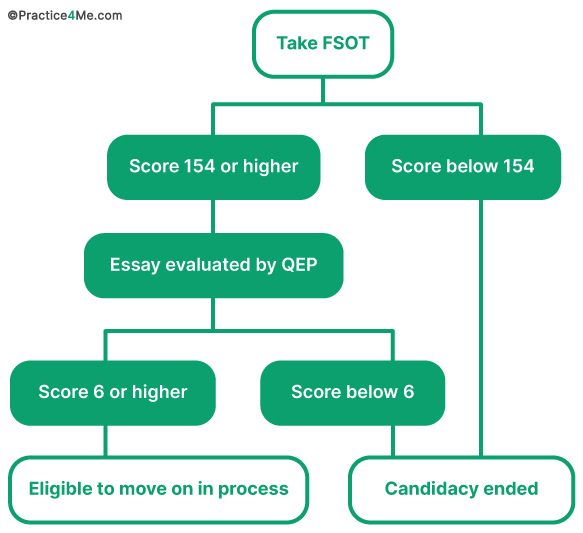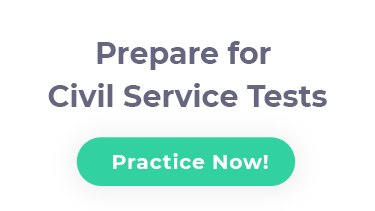What Is the Foreign Service Officer Test?
The Foreign Service Officer Test (FSOT) is a required exam for anyone seeking to become a Foreign Service Officer (FSO). The test takes about three hours to complete and consists of four sections, including 125 multiple-choice questions, 28 multiple-choice scenarios, and an essay.
The Pearson VUE administers the FSOT exam on behalf of the Department of the State and the Foreign Service. The test is a computer-based assessment given at specific Pearson VUE testing centers.
The purpose of the Pearson FSOT is to screen candidates who are likely to succeed in the Foreign Service. The assessment is a required and crucial stage in the Foreign Service Officer Selection Process.
Foreign Service Officer Selection Process
An FSO is a member of the United States Foreign Service that assists in formulating and implementing the foreign policy of the U.S. These diplomats support prosperity, promote peace, and protect American citizens while advancing U.S. interests in other countries. There are five career paths in the Foreign Service, all of which will require you to take the Foreign Officer Test:
- Economic Affairs
- Political Affairs
- Consular Affairs
- Management Affairs
- Public Diplomacy
To become an FSO, you must go through the following process:
- Step 1: Choose a Career Path. You must choose which of the five career paths above best align with your passions and skills.
- Step 2: Register for the FSOT. There are eligibility requirements that you must meet to register for the FSOT. Additionally, you must register within specific testing windows and pay a test fee.
- Step 3: Pass the FSOT. Once registered, you will need to prepare for and do well on the FSOT exam.
- Step 4: Qualifications Evaluation Panel. Those who do well on the FSOT will move on to the Qualifications Evaluation Panel (QEP), and the panel will grade and review your written essay.
- Step 5: Oral Assessment. Successful candidates will then need to complete an oral assessment, essentially a job interview.
- Step 6: Medical and Security Clearances. Each position will require different clearances. They will notify you of the requirements once you reach this process stage.
- Step 7: Suitability Review Panel. This stage is essentially a background check. A panel will review your past behaviors, criminal record, and prior employment to determine if you are suited for a career in the Foreign Service.
- Step 8: The Register. If you successfully complete all stages of the process, your name is placed on a register for 18 months, and you may be offered an appointment if an opportunity becomes available.
Who Can Take the FSOT Exam?
There are specific eligibility requirements for those who wish to take the FSOT. Those requirements state that test takers must be:
- A U.S. citizen
- Between the ages of 20 and 59 during registration for the FSOT
- Between the ages of 21 and 59 when appointed an FSO
- Available for assignments worldwide
Registering for the FSOT Test
There are three times throughout the year that you can register for the FSOT. The test is administered in February, June, and October, with registration windows opening five weeks before each exam. Please note that though the test is offered three times per year, you are only eligible to take the exam once every 12 months.
Foreign Service Exam Fees
Test-takers must also pay a test fee for the FSOT exam. The test fee is $5. However, if you cancel your registration within 48 hours of the test or miss the exam, you will be charged a $72 fee. You must pay this fee before you are eligible to reschedule your test.
FSOT Test Sections
Job Knowledge
The Job Knowledge section of the FSOT consists of 60 questions that you will have 40 minutes to complete (40 seconds per question). This exam portion will cover several areas across all five Foreign Service career paths. You will be required to have an understanding of several subjects, including:
- World History: Including historical events, developments, and issues, particularly their impact on U.S. foreign policy.
- S. History: Including significant events, politics, national customs, and the influence of society on foreign policy in the U.S.
- S. Government: General understanding of the U.S. political system, including the constitution and congress’s role in foreign affairs.
- Math and Statistics: Knowledge of basic math and statistical procedures.
- Economics: Understanding of basic economic principles and the U.S. economic system.
- Communication: Understand the components of effective communication, including public speaking, media, and the techniques of public diplomacy.
- Management Principles: General understanding of human behavior, motivational strategies, and leadership.
- Computers and Internet: Basic knowledge of spreadsheets, email, word processing, and internet use.
SJT
The Situational Judgment Test (SJT) in the FSOT exam consists of 28 questions that you will have 42 minutes to complete (90 seconds per question). For each question, you will receive a scenario and four or five possible responses, to which you will need to identify the best and worst choice. The scenarios in this test will cover different aspects of team building, professional standards, workplace issues, and decision-making.
Please note that you will not need any particular knowledge of State Department or Foreign Service policies to complete this exam portion. However, you will want to ensure that you keep FSO values in mind, approach every scenario diplomatically, and respond honestly to each question. Practice free SJT test questions to score higher.
English Expression
The English Expression portion of the FSOT exam has a time limit of 50 minutes, during which you will need to answer 65 questions (46 seconds per question). This section will test you in all aspects of the English language, including grammar, vocabulary, and sentence structure.
During this section, you will need to correct sentences, choose the correct sentence out of the options given, and organize or revise given paragraphs. This test portion is also multiple-choice; you will receive four options for each question. Click here to practice additional free verbal reasoning test questions.
English Essay Writing
The last portion of the test is the written essay. You will have 32 minutes to complete this section. You will receive seven minutes to choose from three topics, and then you will have 25 minutes to complete a 400 to 700-word essay. During this write-up, you must pick a position on the topic and defend the rationale for your opinion. The reviewers will score your essay based on how well you analyzed and defended your position.
Topics in this section may cover areas in any of the career paths, including:
- Education
- Economics and finance
- History
- International affairs
- Social issues
- Customs and culture
Foreign Service Officer Test Scoring
It will take roughly three weeks to receive your score from the FSOT exam. The results are given in percentiles, which means your raw score is compared to other test-takers before calculating your final score.
The first three test sections (Job Knowledge, Situational Judgment, and English Expression) are scored first. You must have a combined score of 154 to pass this first scoring round. If you fail to make a 154, your candidacy will end, and you will have the option to retest in 12 months.
If you receive a score of 154 or higher on the multiple-choice portion of the FSOT, The QEP will receive your essay to review. The essay score is worth up to 12 points, though a score higher than 8 is rare. You must obtain a six or higher on the essay to pass. Any candidates who score below a six will be eliminated from the process.

How to Prepare for the Foreign Service Officer Exam?
The Foreign Service test is difficult for candidates because of the knowledge required and the strict time limits on each section. There is also a lot of pressure due to the 12-month wait time between attempts. To ensure that you do well in all areas of the FSOT, you must prepare for different portions of the exam.
You can find FSOT prep online, including practice FSOT questions and full-length Foreign Service Officer practice tests. Be sure to work through the sample questions to help you understand what kinds of questions you will be asked on the U.S. Foreign Service exam. Full-length tests can also help you rehearse your timing for the actual exam.
Because the FSOT exam is so complex, studying is the only way to do well. Take advantage of all the resources available to you and be sure you thoroughly prepare before you register for the exam. Those who take the time to prepare are more likely to do well on the test and progress in the FSO process.


